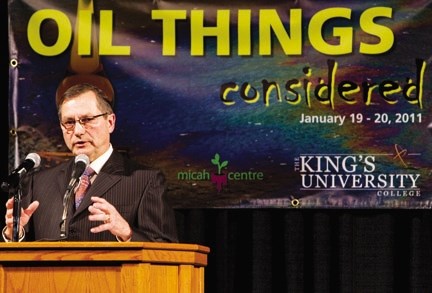How many liquid slaves did you use today?
That was one of the many big questions raised last week during a free conference on the oilsands at Edmonton's King's University College. Some 500 students and area residents gathered for two days of talks about oilsands development, including one by Premier Ed Stelmach.
The oilsands are a complex, global issue, Stelmach told the crowd Jan. 19, and Albertans need to be part of the debate on how to use them.
"Those who seek to reduce this discussion to a slogan on a banner or a catchphrase do us all a great injustice," said the premier.
The oilsands aren't the demon they're sometimes made out to be, he said. Alberta's oilsands produce fewer greenhouse gas emissions per barrel than California heavy oil for example, and comparable amounts to those produced by oil from Iraq, Nigeria and Venezuela.
"Can anyone say that these nations take their environmental and most importantly social obligations as seriously as Alberta does?"
That's a troubling argument, said Wayne Groot, a Sturgeon County potato farmer who spoke on the effects of oilsands development at the conference. Albertans still have a choice as to how fast they develop this resource.
"Just because they're bad and we're a little less bad doesn't make it right," said Groot.
How much do we need?
The two-day conference was part of the Christian college's interdisciplinary studies program, said director Roy Berkenbosch, adding the oilsands have been called everything from ethical oil to dirty tar and the conference was meant to help people pick apart the assumptions behind those labels.
Global energy demand is projected to rise 30 per cent in the next 20 years as nations like China develop, Stelmach said, about 80 per cent of which would come from fossil fuels.
"We need energy and we'd be foolish to turn our backs on the second-largest proven oil reserve in the world," said Stelmach.
But how much energy do we need? Most Canadians use 24.7 barrels of oil of energy a year, said noted journalist and oilsands researcher Andrew Nikiforuk, equivalent to 204 years of slave labour. China gets by on four barrels of "liquid slaves" per person a year, while Europe uses about 16.
"How much oil are we entitled to?" questioned Nikiforuk.
Alberta is reducing its greenhouse gas emissions per barrel of oilsands oil, said Stelmach, who went on to acknowledge those reductions had been offset by greater oil production. He raised carbon capture technology as a way to further reduce emissions.
Carbon capture is too energy intensive to offset oilsands emissions, Nikiforuk said, and conservation and renewable power could greatly reduce global demand for oil.
"Are we preparing for (that future) or are we putting all our eggs in one basket?" asked Nikiforuk.
Nikiforuk called on government to follow Norway's lead by saving its oil revenues instead of spending them.
"Easy money encourages bad behaviour in industry just as it does in government, and that's why it has to be put aside."
Norway now has a $500 billion fund to draw on when its oil runs out. Alberta has just $14 billion.
Christianity calls on us to be good stewards of creation, Berkenbosch said, which means asking questions that mainstream views often ignore.
"Is it really the case we need more energy?" he asked. "Is it really the case that this is actually economically viable?"
Albertans need to start thinking like owners, Nikiforuk said, which means collecting our fair share of royalties and cleaning up our messes.
"You're not just a consumer of this resource; you're an owner of this resource," he said. "Your future depends on how this resource is governed."




